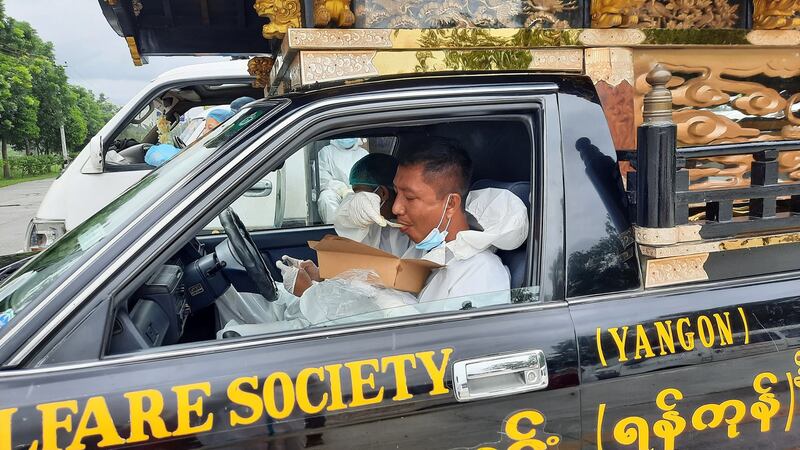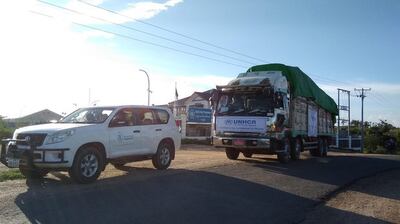A failure to quickly control soaring COVID-19 infections and deaths amid a third wave of the coronavirus in Myanmar could bring the country to its knees, medical experts said Wednesday, while blaming the junta for allowing the national healthcare system to disintegrate after it seized power in February.
The number of infections in Myanmar rose by 5,860 over a 24-hour period to a total of 246,663 since the the country’s first recorded case in March last year. The official monthly infection rate has jumped from around two percent of those tested in April 2020 during the first wave of the coronavirus to 23 percent earlier this month, although the actual rate is unknown because currently only 12,000-15,000 COVID-19 tests are being administered each day.
At least 5,814 have died in the country, including more than 2,200 in the first three weeks of July alone, and the U.S. Center for Disease Control and Prevention recently designated Myanmar a level 4 COVID-19 nation—its most dangerous ranking—citing the daily rising number of deaths.
Meanwhile, the country’s hospitals are operating at maximum capacity and turning away all but the most seriously ill. Others must settle for treatment at home, but shortages have left families scrambling to secure basic of medical supplies, including the oxygen they need to keep their loved one alive.
A statement issued by the Myanmar Medical Association on July 19 warned that the current pandemic is “seriously affecting the health and economy of the people of the country as a whole” and must be addressed through a new “whole of society” approach.
Dr. Than Naing Soe, a spokesman for the junta’s Ministry of Health and Sports, recently called on the 54 million citizens of Myanmar to put aside their differences and “work together” to bring the outbreak under control.
“We must all work together to stop this … only then can we overcome this problem successfully,” he said, adding that the government had procured vaccines and would begin rolling them out to the public on Thursday.
“We believe we can overcome this as a united people, but we all need to work together and fulfill our responsibilities.”
Dr. Than Naing Soe said 16 million people are expected to receive vaccinations this year—more than half the country’s population over the age of 18. Only 10 percent of that goal had been reached as of late July.
The United Nations Office on Drugs and Crime (UNODC) said in a statement on July 19 that it estimates only around 20 percent of Myanmar's population will be fully vaccinated by the end of 2021 according to World Health Organization (WHO) immunization guidelines.

Junta mismanagement
Dr. Zaw Wai Soe, the health minister for Myanmar’s shadow National Unity Government (NUG), told RFA’s Myanmar Service that the country’s leaders had plenty of time to prepare for the third wave of the virus after watching it spread in neighboring India and Thailand, and after dealing with two earlier outbreaks.
“Management is crucial, but right now there is no proper management,” he said, referring to the political chaos that has engulfed Myanmar in the aftermath of the junta’s Feb. 1 coup d’état.
“The health sector did not take any precautionary measures for this [current wave] and the country is in this situation because there is a weakness in management.”
A doctor who treated COVID-19 patients during the first and second waves said the situation is likely to get worse, as Myanmar's entire health system had collapsed.
“In a [administrative] system, there must be good leaders and good followers, but now, that system is broken,” she said, speaking on condition of anonymity.
“Our entire health system is in a very sorry state. There’s no good leader to make decisions … [and] there are very few health workers who will continue to work in the health sector. If it goes on like this, if left unmanaged, a very worrisome situation will arise.”
Myanmar’s military says it was right to seize power because a landslide victory by Aung San Suu Kyi’s National League for Democracy (NLD) in the country’s November 2020 ballot was the result of voter fraud. The junta has provided no evidence to back up its claims and violently responded to widespread protests, killing 929 people and arresting 5,323, according to the Bangkok-based Assistance Association for Political Prisoners (AAPP).
Tens of thousands of people, including many healthcare professionals, have left their jobs to join a nationwide Civil Disobedience Movement (CDM) in opposition to junta rule.
A doctor in Mandalay told RFA it will not be easy to control the latest outbreak under the leadership of the junta.
“Even developed countries like the United States and the European states have had a very hard time trying to control the pandemic,” he said.
“But in a situation like ours, where the military has seized power without any support from the people, it will be extremely difficult.”
Last week, the United Nations Special Rapporteur for the situation on human rights in Myanmar, Tom Andrews, called on the international community to intervene.
“An explosion of COVID cases, including the delta variant, the collapse of Myanmar’s healthcare system, and the deep mistrust of the people of Myanmar of anything connected to the military junta, are a perfect storm of factors that could cause a significant loss of life in Myanmar without emergency assistance by the international community,” said Andrews.

UN assistance blocked
As Myanmar’s COVID-19 cases continued to rise, sources told RFA that the junta is restricting United Nations aid workers from accessing thousands of refugees in Chin state, despite an urgent need for shelter and medication in the region, where residents have fled a military offensive against members of a local militia in recent months.
On Monday, a group of staffers from the United Nations High Commissioner for Refugees (UNHCR) left Myanmar’s largest city Yangon with a truck full of medicine and relief goods for some 1,000 refugee families numbering around 5,000 people in for Chin state’s Mindat township.
The UNHCR convoy arrived in Mindat that evening and on Tuesday began a planned three-day distribution of COVID-19 personal protection equipment (PPEs), mosquito nets, mats, blankets, kitchen utensils, solar lanterns and tarps for the rainy season.
However, a monk from Mindat told RFA that junta troops only allowed the group to assist about 50 families sheltering in a military controlled monastery and church in the township, citing “security concerns.”
“The U.N. people were only allowed to hand out supplies at a church officially recognized as a refugee camp by the military—I heard that these were the only donations given away,” he said, speaking on condition of anonymity.
“If they hope to go to nearby villages, they will only be permitted to access refugee camps recognized by the junta. [The troops] said they were not allowed to go [elsewhere] because the area was too dangerous.”
A refugee worker in Mindat said the UNHCR will return its remaining supplies to Yangon if it is not permitted to travel freely in the region.
“[People] who have returned from the jungles and are now back at their homes in town were not allowed to receive any donations and the UNHCR staff were not allowed to travel to the villages [to assist refugees],” the worker said.
“Since they could not negotiate with the military, the UNHCR will take the remaining items back to Yangon after helping the 50 families it was allowed to meet with.”
A member of the Christian clergy, who declined to be named, said UNHCR officials had called on the local army commander and the General Administration Office to lift the ban on travel and were still in negotiations on Wednesday.
“I heard that they were asking for permission to distribute the rest [of their supplies] to people in the nearby forests and those in various wards of the town,” he said.
“I don't know yet if they will get permission. I think the army did not allow them to go because it could not take responsibility for their security.”
An RFA request to the UNHCR office in Yangon for comment on the situation went unanswered on Wednesday.
More than 50,000 people—including 15,000 from Mindat alone—have fled their homes in Chin state since late April, when the military launched an offensive against the local People’s Defense Force (PDF) militia, formed to protect the public from the junta’s troops in the aftermath of its coup d’état.
According to the United Nations and aid groups, conflict in Myanmar’s remote border regions has displaced an estimated 230,000 residents since the junta coup. They join more than 500,000 refugees from decades of conflict between the military and ethnic armies who were already counted as internally displaced persons (IDPs) at the end of 2020, according to the Internal Displacement Monitoring Center, a Norwegian NGO.
Reported by RFA’s Myanmar Service. Translated by Khin Maung Nyane. Written in English by Joshua Lipes.
